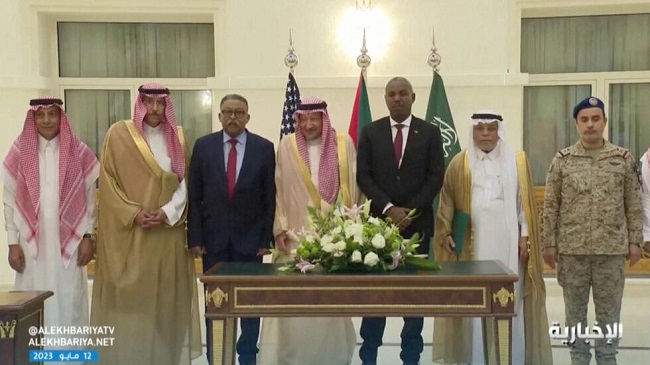Sudan’s rival forces agree to protect civilians, no deal on ceasefire
Sudan’s warring factions early on Friday committed to protect civilians and the movement of humanitarian aid, but did not agree to a ceasefire and remain far apart, US officials said.
After a week of talks in the Saudi port of Jeddah, Sudan’s army and rival paramilitary Rapid Support Forces (RSF) signed a declaration that they would work towards a short-term ceasefire in further discussions, they said.
“The two sides are quite far apart,” a senior US State Department official said, speaking on condition of anonymity.
A text of the declaration released after the talks said the two factions “commit to prioritizing discussions to achieve a short-term ceasefire to facilitate the delivery of emergency humanitarian assistance and restoration of essential services.”
A US State Department statement said the parties would focus on reaching a deal for an effective ceasefire of up to about 10 days.
Negotiators working with Saudi and US mediators will next discuss specific security measures for safeguarding relief supplies, the US official said. The State Department statement said measures “will include a US-Saudi and international-supported ceasefire monitoring mechanism.”
The army and RSF said in their agreement that they would schedule “subsequent expanded discussions to achieve a permanent cessation of hostilities.”
The US official said it would be a long process to move from a temporary ceasefire, once agreed, to a permanent cessation of hostilities. But Washington hopes the two sides’ willingness to sign Friday’s declaration will build momentum.
Civilian groups are expected to participate later in the talks, the US official said. The Forces for Freedom and Change, a coalition of political parties supporting democratic rule, called the declaration “an important first step towards ending the war” and urged the forces to abide by it.
Clashes rocked Halfaya, an entry point to the capital Khartoum, on Thursday as residents heard warplanes circling over Khartoum and its adjoining cities of Bahri and Omdurman, but the fighting appeared calmer than on Wednesday.
In public neither side has shown it is ready to offer concessions to end the conflict that erupted suddenly last month, threatening to pitch Sudan into a civil war, killing hundreds of people and triggering a humanitarian crisis.
Previous ceasefire agreements have been repeatedly violated, leaving civilians to navigate a terrifying landscape of chaos and bombardment with failing power and water, little food and a collapsing health system.
Allow dead to be buried
The senior State Department official said the declaration signed early Friday seeks to improve the flow of humanitarian relief and begin restoration of water and electricity services.
Mediators hope it will be possible “to arrange for the withdrawal of security forces from hospitals and clinics, and to perform the respectful burial of the dead,” the official said.
The World Health Organization has said more than 600 people have been killed and more than 5,000 injured in the fighting. The Health Ministry said at least 450 people were killed in the western Darfur region.
Many have fled Khartoum and Darfur, uprooting 700,000 people inside the country and sending 150,000 as refugees into neighbouring states, according to U.N. figures.
Cameron Hudson of the Centre for Strategic and International Studies in Washington said implementing any deal would be challenging.
“They are locked in this fight to the finish and they will sign a piece of paper and Washington will celebrate a big victory but I don’t think it will change the dynamics of the conflict,” Hudson said.
Western countries condemned abuses by both sides at a human rights meeting in Geneva, but Sudan’s envoy there said the conflict was “an internal affair”.
Source: REUTERS





